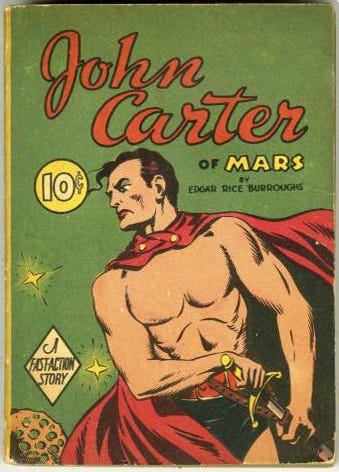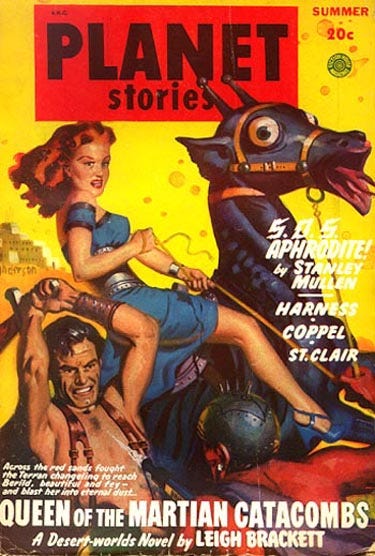Sword & Planet - The Long Lost Child of Fantasy and Science Fiction
A brief historical overview and opinion piece on an obscure speculative fiction genre
For the month of June, Senchas Claideb is going to be digging up some lore on Sword & Planet, an obscure genre from the early days of pulp fiction, echoes of which can be seen in modern popular media such as Star Wars and more recently the film adaptations of Dune. As the title of this article suggests, Sword & Planet in a nutshell is a weird cross between fantasy and science fiction, leaning much more heavily into the former genre. On a deeper level, it could also be considered Heroic Fantasy (i.e., Sword & Sorcery) in space. From the blog Swashbuckling Planets, writerdariel succinctly distinguishes between the broad umbrella of Planetary Romance (which Sword & Planet falls under) and S&P:
While Planetary Romance deals with adventure on exotic alien worlds, Sword and Planet is about milieus where the action is anachronistic and often infused with anachronistic ideals like chivalry. Both feature adventures set primarily on a single planet, and that planet’s physical and social environment play large parts in the story. Both are differentiated from Space Opera by de-emphasis on interplanetary travel. Star Wars is more Space Opera because a lot of the action happens on board spacecraft, in between planets; while Flash Gordon is more Sword and Planet because the action all takes place on Mongo.1
Most fans of American pulp literature will think immediately of Edgar Rice Burroughs’ Barsoom stories at the mention of this genre. Set in a highly fantastical version of Mars, it follows former Confederate soldier John Carter who is transported to the red planet. The Earth-man finds himself caught amidst wild and exotic situations as he fights his way to the top of the Martian nobility. The series is a wild mix of swashbuckling, pseudo-science fiction, and Burroughs' own mythopoeia that was not given the right amount of justice when Disney adapted it into a feature film in 2012. Admittedly, this was my first introduction to the character, setting, and entire genre of Sword & Planet. Even as a 13-year-old kid, I recognized both the interesting and more lackluster parts of the movie. I was surprised to hear my Dad and Grandpa off-handedly mention that John Carter had started as a series of books; I was interested to know more, but for whatever reason, I never tracked them down myself.
Another classic character of Sword & Planet literature is Leigh Brackett’s Eric John Stark, a quite different man from John Carter in terms of background and trajectory throughout his stories. Unlike John Carter, Stark has never known the soil of Earth, having been born on Mercury during an imagined future where Earth has colonized most of the known universe. He is raised by the native inhabitants of the first planet from the sun, but is captured by other humans. Over the course of his stories, Stark takes on the role of freedom fighter as he sides with “alien” inhabitants of planets against the oppression of Earth’s colonization efforts. Although not quite a one-for-one “Conan in space”, Stark has at least some of the anti-authoritarian trappings of Robert E. Howard’s barbaric heroes as he resists and helps others resist the constraints of an imperialistic society.
As stated in the opening to this post, Sword & Planet relishes in its pulpy roots as a subgenre that blends the setting of space with the wonder of fantasy. Although far from prolific in the modern stream of popular culture, elements of it can still be found in a select few pieces that have garnered attention from the general public. At the forefront of this, in the past several years, is Denis Villeneuve’s adaptation of Frank Herbert’s Dune. Although Dune is decidedly much more hard sci-fi than classic Sword & Planet and leans into the sweeping scope of a Space Opera, the case can be made for some of its defining features to be echoes of the older genre. Paul Atreides, like John Carter, is a fish out of water character who eventually acclimates and is accepted by the native Fremen of Arrakis.2 Similarly to Eric John Stark, he fights for their freedom, although his motives are not nearly as altruistic as Stark’s, given that he intends to replace an old regime with his own. The whole idea of the great houses of the Landsraad adopting a medieval approach to politics and societal order also recalls the archaic customs Sword & Planet is wont to use in its stories. Speaking of anachronisms, there is of course the emphasis of swords and knives as the primary weapons in Dune. Although they have a logical reasoning behind why they are used, their appearance alone evokes the very elements of the genre we are discussing—sword and planet.
Although the definitive works of Heroic Fantasy (Sword & Sorcery) came almost a decade after John Carter was published, the very concept of the genre of S&P bears striking similarities with having its characters fighting tooth and nail on alien worlds to survive. They don’t rely on high tech or vast, scientific knowledge, but keen, human instinct and even keener blades. The swashbuckling protagonists use all their raw human passion to carve a living in fantastic, dangerous settings. This genre injects the wonder that comes with fantasy into pseudo-scientific settings, putting primary characters at the center of its stories who embody human passion and energy. Although surrounded by alien beings and environments, they bring from Earth the natural, unwavering human will to survive and leave a mark on the minds of their friends and foes or die trying.
Thanks for reading this week’s post! What are your favorite Sword & Planet stories? If this is your first time hearing of the genre, which stories do you plan to check out?
Refer your friends to Senchas Claideb to receive access to special rewards, including a personalized Gaelic phrase and a free, original short story!
Follow me on other social media platforms!
“What is Sword and Planet?” Swashbuckling Adventures. https://swashbucklingplanets.wordpress.com/2020/08/24/what-the-heck-is-sword-and-planet/
…Dune, Desert Planet.






I would like to submit that my story The Desert Hook in Waystation 1 is my love letter to this genre - I would very much like to see it get its own glut!
Some time back Paizo had published a series Planet Stories, it's worth looking those up.